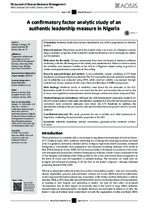A confirmatory factor analytic study of an authentic leadership measure in Nigeria

View/
Date
2020Author
Balogun, Tolulope V.
Mahembe, Bright
Allen-Ile, Charles O.K.
Metadata
Show full item recordAbstract
Authentic leadership has been identified as one of the competencies for effective leaders. Research purpose: The primary goal of the present study was to test, on a Nigerian sample, the psychometric properties of the Authentic Leadership Inventory (ALI) developed by Neider and Schriesheim. Motivation for the study: Various instruments have been developed to measure authentic leadership, with the ALI being one of the widely used questionnaires. There is a need to assess the reliability and construct validity of the ALI on a Nigerian sample owing to paucity of studies on its psychometric properties in this setting. Research approach/design and method: A non-probability sample consisting of 213 bank employees working in Nigeria was studied. The ALI was used to measure authentic leadership, and its reliability was evaluated using SPSS, while construct validity was assessed through confirmatory factory analyses in the Linear Structural Relations (LISREL) programme. Main findings: Moderate levels of reliability were found for the subscales of the ALI.
